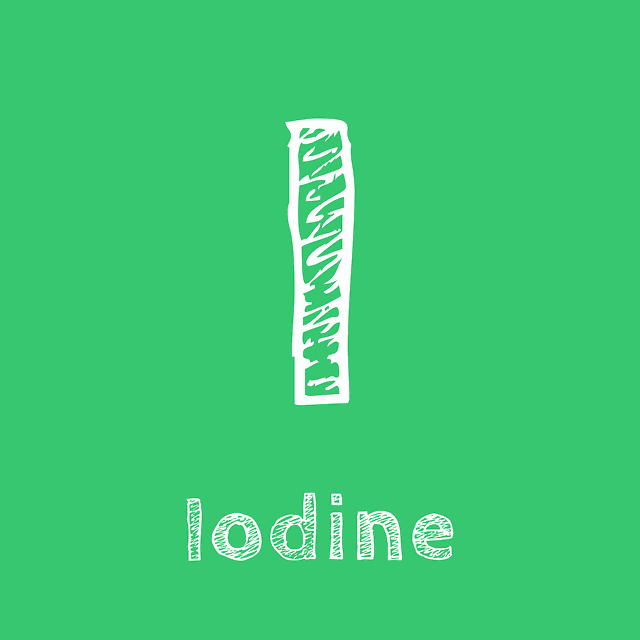HOW IODINE DEFICIENCY IN DIET IS KNOWN TO CAUSE 7 DEADLY AILMENTS?
Iodine Deficiency

Iodine deficiency in diet is known to cause numerous deadly disorders. Iodine deficiency in diet is known to cause serious metabolic, growth and development disorders.
Iodine plays a crucial role in our overall health and well-being. The daily recommended intake of iodine for an adult is 150 micro grams. As a key component of thyroid hormone, iodine deficiency in diet is known to cause thyroid gland malfunctioning.
The iodine requirements may vary as per the age of the recipient. The daily recommended dose of iodine is as follows:
| Age | Recommended Daily Requirement (micro grams) |
| Up to 6 months of age | 110 mcg |
| From 7-12 months | 130 mcg |
| 1-8 years | 90 mcg |
| 9-13 years | 120 mcg |
| 14-18 years | 150 mcg |
| Adults | 150 mcg |
| Pregnant women and teens | 220 mcg |
| Lactating mothers | 290 mcg |
However, despite iodine deficiency in diet is known to cause serious problems still its deficiency remains a significant worldwide public health concern. Millions of people worldwide are affected by iodine deficiency which leads towards a series of hostile health consequences.
In this all-inclusive article, we will comprehend how iodine deficiency in diet is known to cause grave ailments and discover the significance of iodine, causes and symptoms of iodine deficiency.
Through understanding the implication of this vital nutrient, we can raise community awareness and further encourage active actions to properly address iodine deficiency and its related serious health risks.
How Iodine Deficiency in Diet is Known to Cause Serious Ailments?

The human body needs trace minerals like iodine in little amounts to function at its best. Its main duty is to maintain the thyroid gland’s healthy operation, which is what produces the thyroid hormones, thyroxine (T4) and triiodothyronine (T3).
These thyroid hormones are essential for controlling the body’s growth and development, energy production, and metabolism.
They affect how the heart, brain, kidneys, skin, and other organs and systems operate. Enough iodine must be consumed in order for the thyroid gland to generate enough of these critical hormones.
In addition to its function in thyroid health, iodine plays the following significant roles in human health:
Neurological development
Iodine is essential for brain development, especially in the early years of life and during pregnancy. Iodine deficiency in diet is known to cause serious problems. Sufficient quantities of iodine are required for the correct development and operation of the neurological system and brain.
Reproductive health
Iodine deficiency in diet is known to cause serious problems in conceiving child among women, the growth of her fetus, and the general health of her unborn child.
Immune function
By bolstering the immune system, iodine helps shield the body from illnesses and infections. Iodine deficiency in diet is known to cause malfunctioning of immune system as well.
Antioxidant properties
Antioxidant qualities found in iodine can help counteract dangerous free radicals and lower the chance of oxidative stress-related illnesses so iodine deficiency in diet is known to cause reduction in antioxidant functions.
What are Iodine Deficiency Causes?
Iodine deficiency in diet is known to cause dietary, environmental, and physiological problems.
In order to effectively address this worldwide health concern, it is imperative to comprehend the basic causes of iodine deficiency.

Inadequate consumption of food
Iodine deficiency is mostly caused by a diet deficient in iodine-rich foods. Natural sources of iodine-rich foods include shellfish, dairy products, and iodized salt. Those who don’t consistently eat these foods run a higher risk of becoming iodine deficient.
Environmental elements
There may be less iodine in the local food supply in some areas due to naturally low iodine concentration in the soil and water. This plays a major role in the iodine shortage that many developing nations experience.
Digestion and malabsorption problems
Disorders that interfere with the body’s ability to absorb nutrients, such Crohn’s disease, celiac disease, or gastric bypass surgery, might make it more difficult for the body to use the iodine that is taken in.
Greater need for iodine
The body may require more iodine during specific physiological states, such as pregnancy, lactation, and childhood development, which could result in a deficit if food intake is inadequate.
Interference with the use of iodine
The body’s capacity to use iodine can be hampered by certain medications, including lithium and several antithyroid treatments, which can exacerbate a deficiency.
What are Iodine Deficiency Symptoms?
The degree and duration of the iodine shortage, the age of the person, and their general health can all have a significant impact on the symptoms of the insufficiency. Iodine deficiency in diet is known to cause numerous serious illnesses which may display various signs and symptoms.
Typical signs of iodine deficiency may include:
Goiter
The development of a goiter, or enlarged thyroid gland, is one of the most obvious and well-known symptoms of iodine deficiency. This may result in a significant enlargement of the neck.
Insufficient thyroid function
Hypothyroidism can arise from insufficient production of thyroid hormones caused by an iodine shortage. Hypothyroidism manifests as lethargy, weight gain, constipation, and intolerance to cold.
Reduced mental capacity
Iodine is necessary for the growth and operation of the brain. Especially in crucial developmental phases like pregnancy and early childhood, iodine deficiency can result in diminished cognitive function, decreased
Delayed development and growth
A lack of iodine in children can hinder their physical growth and development, resulting in stunted growth and delayed puberty.
Obstetric and reproductive complications
Pregnant women who have low iodine levels are more likely to experience miscarriage, stillbirth, and congenital abnormalities such cretinism, which is characterized by severe mental and physical impairment.
Compromised immunity
The immune system is supported in part by iodine. A diminished immune system and heightened vulnerability to infections are two possible outcomes of deficiency.
Elevated risk of specific types of cancer
According to specific research, there may be a connection between low iodine levels and a higher risk of breast, prostate, and some forms of thyroid cancer.
It’s crucial to remember that these symptoms can range in intensity, and mild to severe iodine deficiency may not necessarily exhibit overt clinical symptoms. It is imperative to do routine iodine status screenings and monitoring, particularly for susceptible populations including young children and pregnant women.
What are Iodine deficiency’s effects on human health?

A shortage in iodine can have profound effects on human health, impacting all facets of physiological and neurological processes.
In order to address this worldwide health concern, it is imperative that both individuals and public health officials comprehend the wide-ranging impacts of iodine shortage.
1. Thyroid issues
As was previously noted, iodine is an essential part of thyroid hormones, and a lack of it can cause these hormones to be produced insufficiently, which can result in hypothyroidism. The body may experience weariness, a reduced metabolism, and weight gain as a result of this cascade impact.
2. Impaired growth of the nervous system
Iodine is essential for brain development, especially in the early years of life and during pregnancy. During these crucial times, iodine shortage can have disastrous effects, such as:
• Crohn’s disease
a severe kind of mental and physical retardation marked by stunted growth, poor motor skills, and cognitive impairment.
• A lower IQ and cognitive decline
A deficit in iodine can result in learning challenges, poor academic performance, and a general decrease in IQ.
• A decline in educational achievement
Iodine shortage in children can lead to worse educational outcomes, such as lower rates of secondary school completion and fewer attendance at school.
3. Obstetric and reproductive complications
Pregnant women who are deficient in iodine run the risk of experiencing miscarriage and stillbirth, as well as congenital abnormalities like cretinism and other developmental disabilities.
4. An elevated chance of specific malignancies
Iodine shortage may be associated with a higher risk of developing thyroid, breast, and prostate cancers, according to some research. The precise processes underlying these relationships as well as their degree of strength are still being studied, though.
5. Reduced Immune Response
A strong immune system is maintained in part by iodine. A shortage of iodine may exacerbate an individual’s vulnerability to infections and impair their immune system.
6. Goiter and other conditions linked to the thyroid
As previously indicated, the emergence of a goiter, or enlarged thyroid gland, is one of the primary indicators of an iodine deficit. Long-term iodine deficit can also cause autoimmune thyroid illnesses and hypothyroidism, among other thyroid-related conditions.
What are Coping Strategies against Iodine Deficiency?
Identifying and addressing iodine deficiency is a global health concern that requires proactive actions due to its substantial repercussions. The following are some methods for treating iodine deficiency:
Nutritional therapies
One of the most important ways to treat iodine shortage is to promote the consumption of foods high in iodine, such as seafood, dairy products, and iodized salt. It can be required to fortify or enhance staple diets in areas where iodine-rich sources are rare.
Supplementation
Under the supervision of medical specialists, iodine supplementation may be advised for people with verified iodine deficiency or those who are at high risk, such as small children and pregnant women. To guarantee safe and efficient supplementation, the right dosage and supervision are crucial.
Initiatives in public health
To combat iodine deficiency, governments and public health agencies can adopt large-scale programs such as:
• Making salt and other food products iodized mandatory
• Personalized supplementation for high-risk groups
• Awareness-raising educational initiatives
• Population-level iodine status monitoring and surveillance
Education of healthcare providers
For efficient patient care and prevention, it is essential to make sure that healthcare professionals, such as doctors, nurses, and dietitians, are knowledgeable about the significance of iodine, the diagnosis of deficiency, and the proper management techniques.
Investigation and creativity
Developing more potent therapies and approaches to tackle this global health issue will require ongoing study on the origins, effects, and remedies of iodine shortage.
Through the implementation of a comprehensive and multifaceted strategy aimed at addressing iodine deficiency, we can endeavor to enhance the general health and welfare of individuals and communities worldwide.
Summing Up
Iodine is a necessary mineral for human health, especially for the thyroid gland’s healthy operation and the brain and nervous system’s growth.
Iodine deficiency in diet is known to cause goiter, immune problems, neurological issues and ailments which may hinder growth and development.
Nonetheless, iodine deficiency continues to be a major global public health concern, impacting millions of individuals and resulting in many detrimental health outcomes. Apart from physical problems iodine deficiency in diet is known to cause other neurological problems as well.
The consequences of iodine shortage can be severe and far-reaching, ranging from stunted growth and development and cognitive impairment to thyroid dysfunction and an increased chance of developing certain cancers.
Together, dietary modifications, supplementation, public health campaigns, healthcare provider education, and continuous research and innovation are needed to address this global epidemic as iodine deficiency in diet is known to cause serious problems.
Through increasing knowledge and putting into practice practical measures to counteract iodine deficiency, we may endeavor to guarantee that people and communities everywhere have access to this vital vitamin and can benefit from its numerous health advantages.
Iodine deficiency in diet is known to cause serious illnesses that’s why it is need of time to exercise certain coping strategies and dietary mutations. Investing in iodine deficiency prevention and treatment is a critical first step toward a healthier, wealthier world population.






